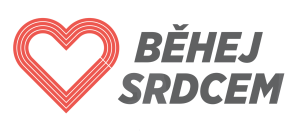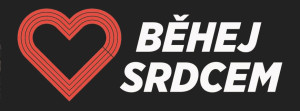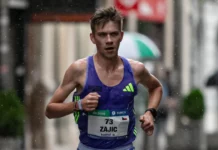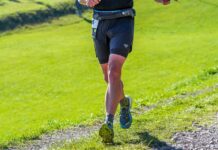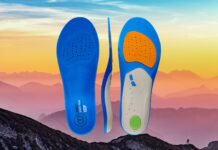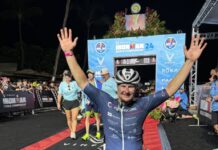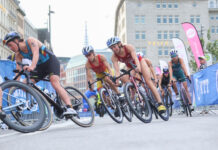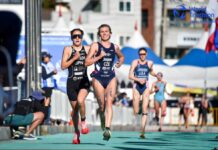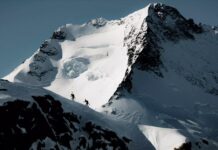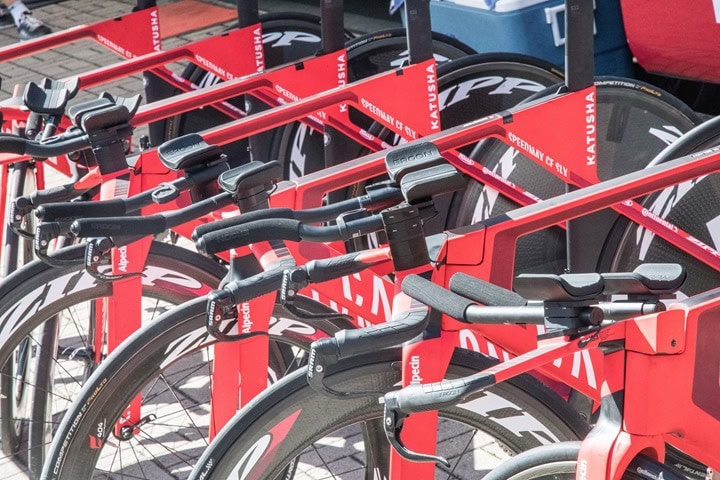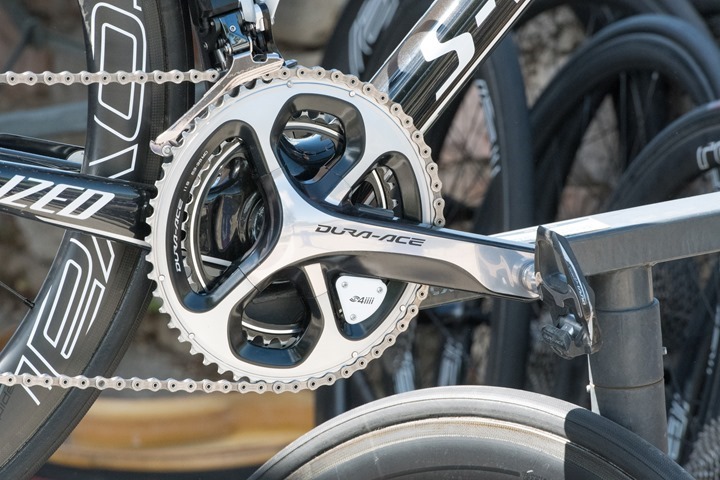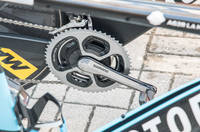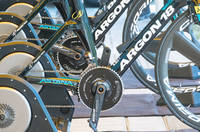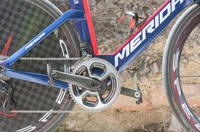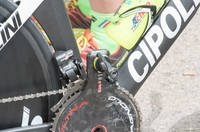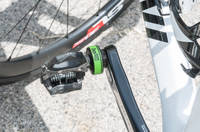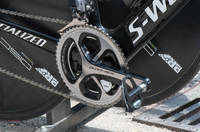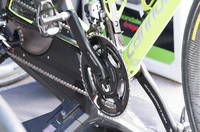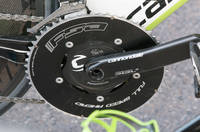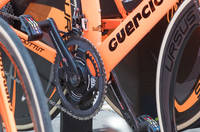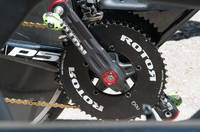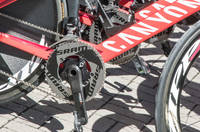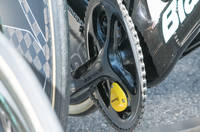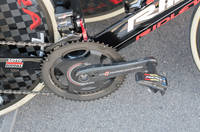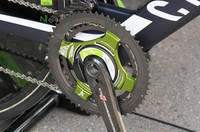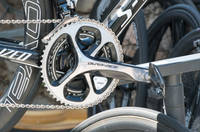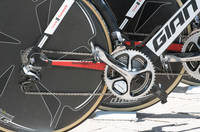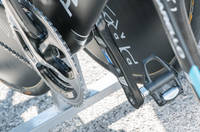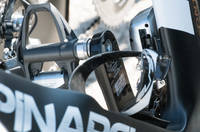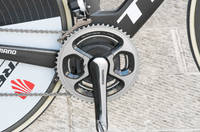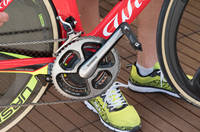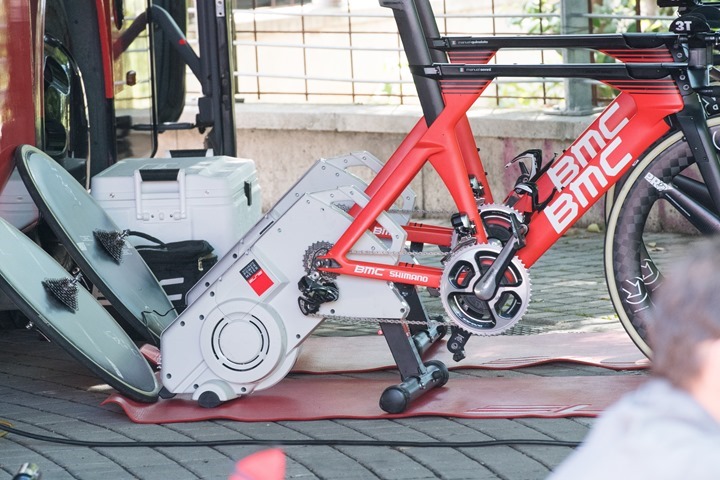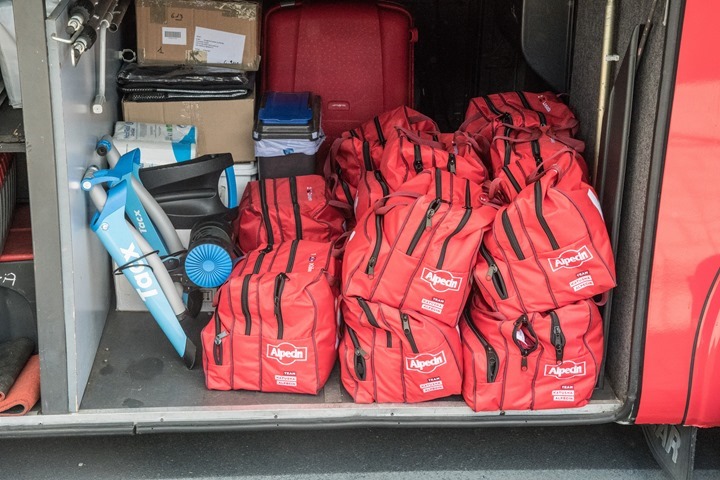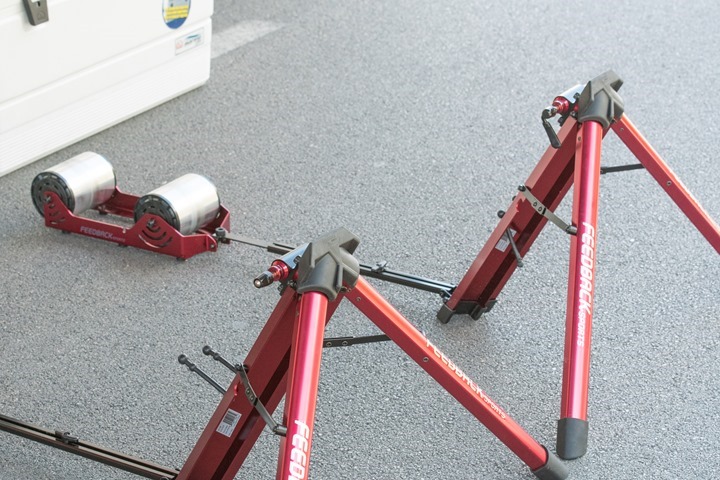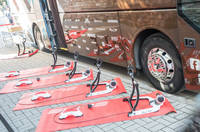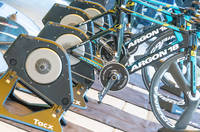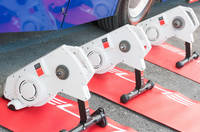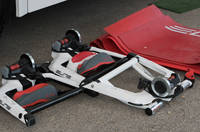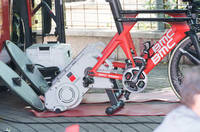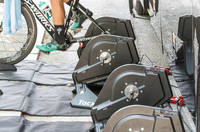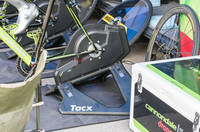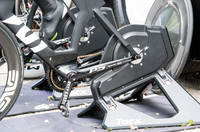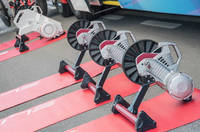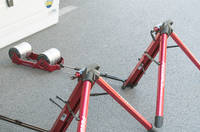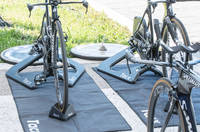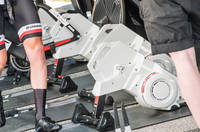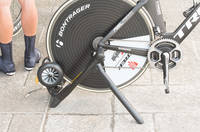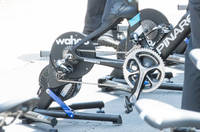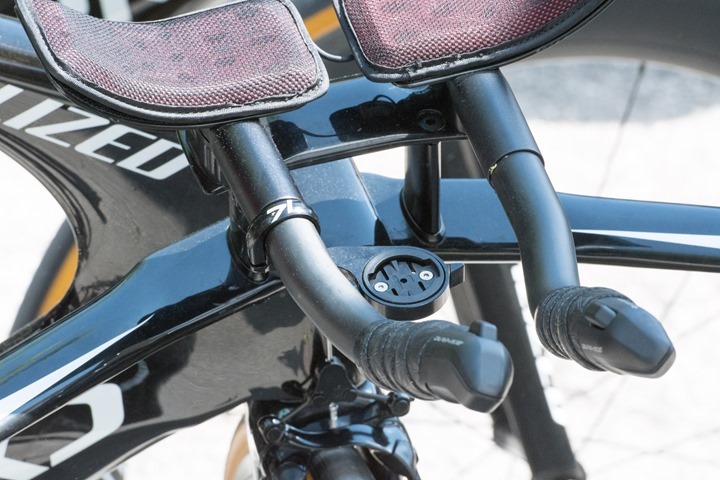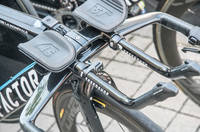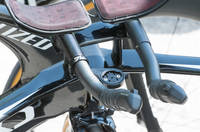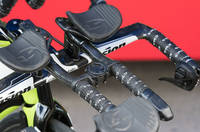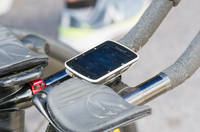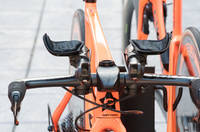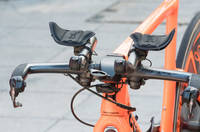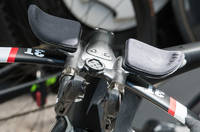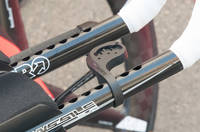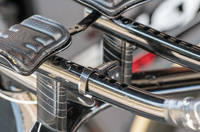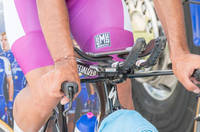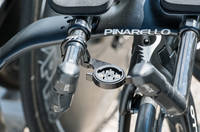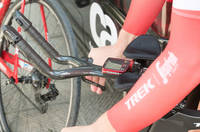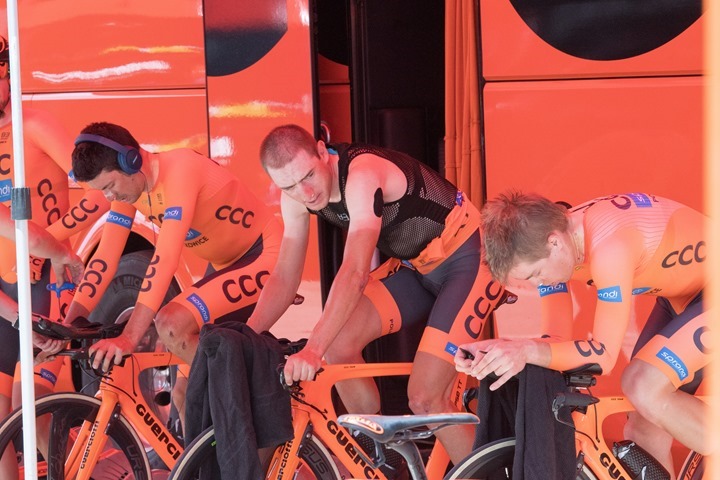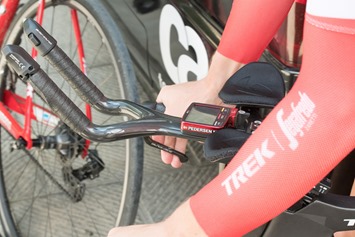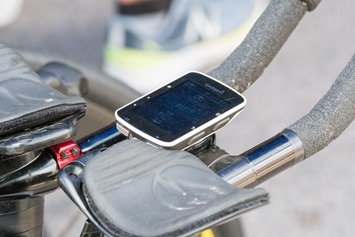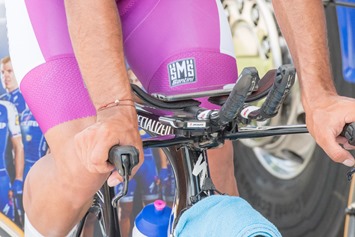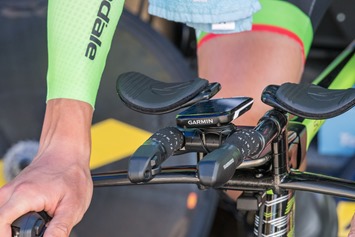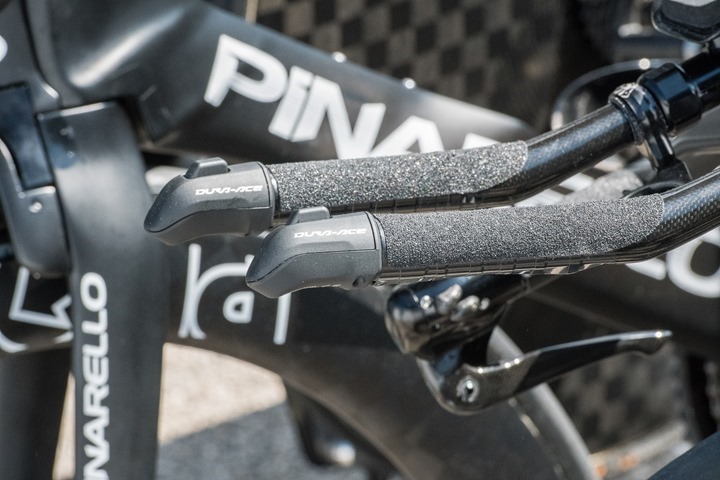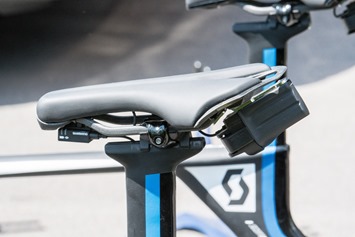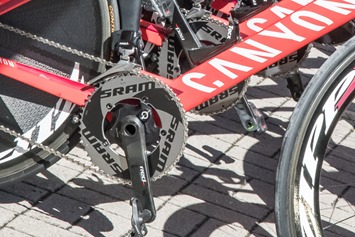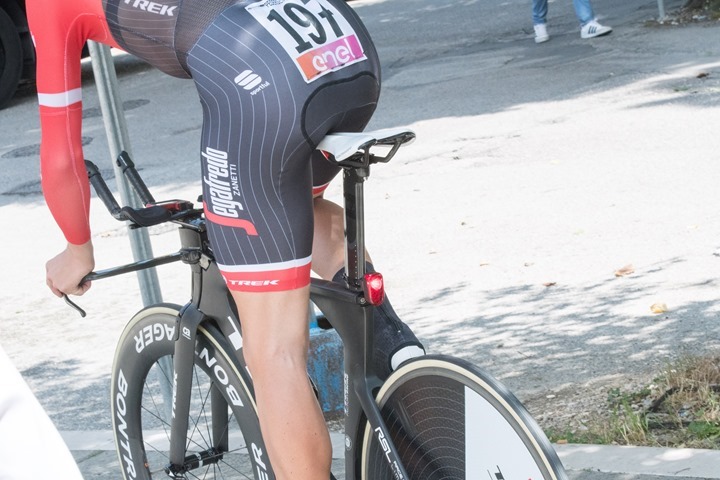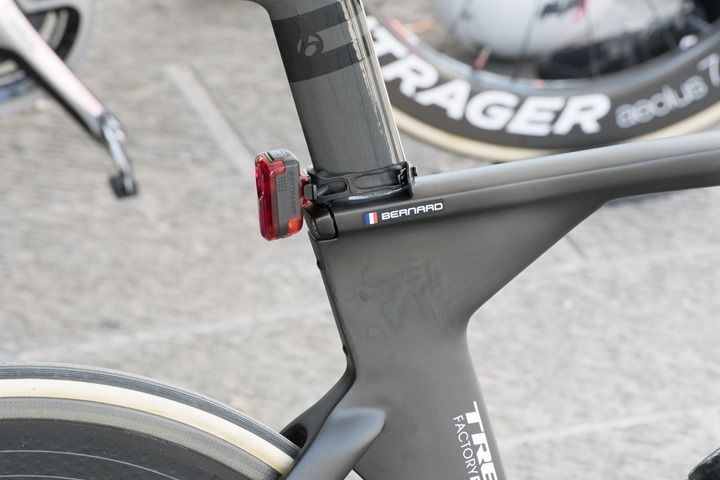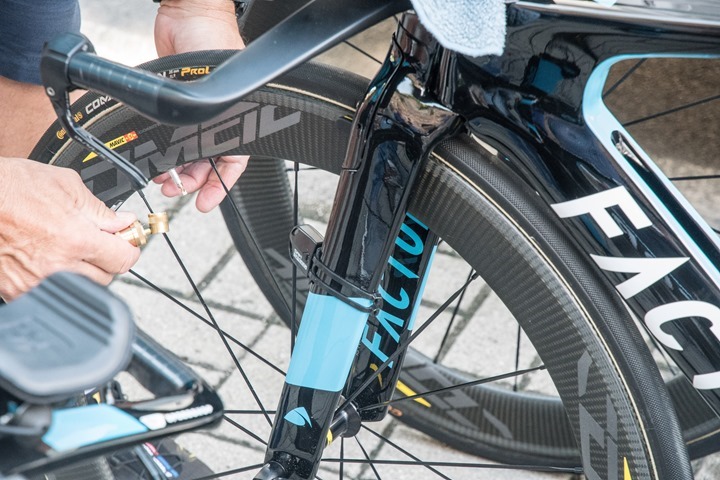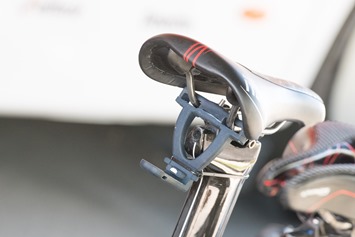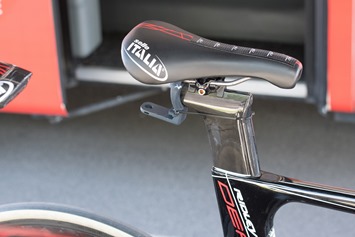Yesterday I spent the full day at the Giro d’Italia checking out all the sports tech goods the pro teams had on hand. In the case of this stage, it was an individual time trial – which means that each rider starts individually, one after another. While that rider will ‘only’ ride 39KM solo, the entire procession of all pro riders takes about 5 hours from start to finish.
This gives me tons of time to check out bikes and related tech. But more importantly – it gives a slightly different insight into the gadgets the pro teams are using. See, with time trial stages you not only get different bikes (TT/triathlon bikes instead of road bikes), but you also get the teams using trainers at the team buses.
So I started off right as the first team vehicles started pulling into the small town of Foligno. I’d make sweeps through over and over again, first to account for the general baseline of the teams’ bikes (i.e. what most riders are using), but then kept checking back on certain teams of interest that may have individual riders on different/unique equipment. This can be done for testing purposes, sponsorship demands, or simply rider preferences. In general riders ‘get away’ with a bit more equipment leniency on a time trial day, since it’s somewhat of a one-off.
I was tracking everything in a spreadsheet on my phone (just Google Sheets), as well as photographing each component from each team. Sometimes that’s a bit trickier than others, for example, the handful of Continental Teams (non-World Tour teams), don’t tend to be as organized as the major teams. So you end up spending more time either tracking those down or just sifting through the significant differences you tend to find on their equipment.
Oh – and don’t worry, I’ve got a non-tech post from the Giro coming up either later today or tomorrow morning. Once I finish editing all the photos. With that, let’s start with power meters.
Power Meters:
Starting with the Tour Down Under back in January, we’ve seen a bit more stabilization of power meters within the pro peloton. Of course, just because pro teams are riding it doesn’t make it the best. It just makes it sponsored. This is true of every bike component I talk about here. Sure, there are cases where teams will pick one component over another for performance reasons – but frankly those are few and far between. Teams follow the money, as they should in pro cycling. After all, it’s a business for profit – not a weekend sport.
Still, it’s fun to look to see what teams are using. In general, my thoughts for each brand are:
SRM: Is heavily used…but less often in a standard way. When I looked at bikes, it was almost non-existent for the exact same SRM model to be used across a given team’s bikes. Rather, it’s was sorta a mixed bag of different models from different years. There were some exceptions to this of course, but by and large there’s not much standardization for most teams running SRM. This again could be rider preferences or if SRM isn’t sponsoring that team officially, they might be pulling power meters from a variety of sources, thus the scramble of units.
4iiii Precision (dual model): They sponsored two UCI WorldTour Pro teams this year, and both teams are riding the dual setup (measures left and right power). In this case, the teams were largely standardized on basically just a couple of models that 4iiii makes in the dual setup (they have far more options in the left-only arena). You’ll remember that 4iiii started shipping the dual config in the second half of 2016.
Power2Max: Power2Max was equally popular here again with pro teams. Most of what I saw though was previous models and not the newer NG units that they started shipping earlier this year. In most cases pro teams tend to put a cutoff of around December for new gear to be used on bikes going forward. So it’s likely it didn’t make the cut. Sometimes you see some mixing up of things in between the Giro and the Tour de France, but that’s rarely team-wide, and tends to be individual rider tests.
ROTOR (2INpower): ROTOR was present with two teams on their 2INpower setup that I just published a review on last week. ROTOR has a pretty long history of having pro teams sponsored on their power meters, so it’s definitely no surprise to see them here as well.
Pioneer: Like ROTOR they continued into 2017 with sponsoring two full teams. This year though with Giant apparently deciding to rebrand make a bike computer, Team Sunweb with Giant as a major sponsor is using Giant’s bike computer instead of the Pioneer one (versus last year both teams used the Pioneer units). As an aside, I do like the fact that Pioneer gets into matching the color scheme on their power meters to the pro teams they sponsor. I remember Power2Max doing that in the past as well (and SRM does it for their head units).
Quarq: One team was using Quarq, which is a bit of a downgrade from last year. And that team wasn’t running the DZero units either (though those too just started shipping around late December/January). I wouldn’t read into this too much, since Quarq/SRAM also expanded out sponsorships in other areas like the women’s teams (as I noted at the Tour Down Under).
bePRO: One of the Italian continental teams (these are kinda like wildcard teams, local to Italy, given slots for the Giro) was using bePRO. You may remember bePRO is an Italian brand, so it’s fitting.
Keep in mind that one thing all power meter companies are trying to do is establish credibility (newer players), or maintain creditability (some existing players). For long term power meter companies like Quarq and PowerTap, there’s little reason to deal with the hassle and overhead of a pro team. Athletes know their power meters are solid, and their name is well known. And the same is true of SRM, but I think the tables are slightly different there. In their case, they’re looking to maintain their name in the news (like this very piece). So it’s not so much a case of maintaining creditability, but instead maintaining brand awareness.
Finally, one thing to note is that I did not see Shimano’s power meter out on any bikes. Though, if the Tour Down Under (and even the Tour de France last year) is any indication, it’s likely on only a rider or two per day. In some cases teams have positioned bikes where I simply can’t see them at the times I went by, thus my bet is someone out there is riding it…but no team has it as the stock config right now.
In any case, here’s the full table of teams:
Giro 2017 Power Meters
| Team | Power Meter |
|---|---|
| AG2R La Mondiale | SRM |
| Astana | Power2Max |
| Bahrain-Merida | SRM |
| BMC Racing Team | SRM |
| Bora-Hansgrohe | 4iiii (dual left/right) |
| Cannondale-Drapac | SRM |
| Team Dimension Data | Rotor 2INPower |
| FDJ | SRM |
| Team Katusha-Alpecin | Quarq |
| LottoNL-Jumbo | Pioneer |
| Lotto-Soudal | SRM (but not all bikes) |
| Movistar Team | Power2Max |
| Orica-Scott | SRM |
| Quick-Step Floors | 4iiii (dual left/right) |
| Team Sky | Stages (dual left/right) |
| Team Sunweb | Pioneer |
| Trek-Segafredo | SRM |
| Bardiani-CSF (Conti Team) | bePRO |
| CCC-Sprandi-Polkowice (Conti Team) | Power2Max (only half the bikes) |
| Wilier Triestina-Selle Italia (Conti Team) | SRM (only one bike) |
And here’s a pile of power meter photos (you can hover over any given power meter to see the name of the team):
Got all that? Good…let’s get rolling onto trainers.
Trainers:
When it comes to bike trainers, two brands dominate the team buses: Elite and Tacx.
They account for every team except three. The three remaining teams split up three other brands, one each: Wahoo, CycleOps, Feedback Sports (Haven’t heard of them? Don’t worry…more on that in a second).
Now in some ways, this is a bit of a shoo-in for Elite and Tacx. With both companies being based in Europe and both companies sponsoring teams in other ways (water bottles, water bottle cages, etc…) – there’s a lot of history there for them to pitch trainers.
However, what we have seen this year is both Elite and Tacx up the ante when it comes to the trainers being used. Gone are the days of low-end sub-$300 models being stashed on the team bus for time trial day. These days both companies have teams using their high-end Elite Drivo and Tacx Neo trainers. In Tacx’s case, every single team sponsored by them was using the Neo. And with Elite, almost everyone was on Drivo, with only a couple stragglers splitting up their team with half Drivo, half other lower end (lighter) options.
Giro 2017 Trainers
| Team | Trainer |
|---|---|
| AG2R La Mondiale | Elite blend |
| Astana | Tacx Neo |
| Bahrain-Merida | Elite Drivo |
| BMC Racing Team | Elite Drivo |
| Bora-Hansgrohe | Tacx Neo |
| Cannondale-Drapac | Tacx Neo |
| Team Dimension Data | Tacx Neo |
| FDJ | Elite blend |
| Team Katusha-Alpecin | Tacx Neo |
| LottoNL-Jumbo | Tacx Neo |
| Lotto-Soudal | Omnium Track |
| Movistar Team | Elite |
| Orica-Scott | Elite |
| Quick-Step Floors | Tacx Neo |
| Team Sky | Wahoo KICKR2 |
| Team Sunweb | Elite Drivo |
| Trek-Segafredo | Cycleops |
| Bardiani-CSF (Conti Team) | Elite Blend |
| CCC-Sprandi-Polkowice (Conti Team) | Elite blend |
| Wilier Triestina-Selle Italia (Conti Team) | Elite blend |
Now there was one interesting little exception to the ‘everything Tacx is Neo’ mantra – which is this Tacx Satori Smart I saw stashed below one bus. Turns out there’s a reason for that: It’s for a podium winner to cool-down while waiting for awards.
See, with the Neo weighing some 48lbs/21kg, it’s a beast to transport by hand (trust me, I’ve dragged one of them close to a mile). Since team buses are rarely placed next to the finish area, this allows the team to carry the far lighter (about 17lbs/7kg) Satori Smart to the finish line. Neat, huh?
Oh – and finally, not much to say on the remaining three. Wahoo has long sponsored Team Sky for their trainers (but not head units). And the CycleOps trainers for Trek is likely just because Trek and CycleOps have a long history, largely because they’re located very close to one another.
As for Feedback Sports? Well…I guess just something to keep me on my toes:
I had immediately recognized the design, but not the brand. I had recognized it as the Omnium trainer, which indeed it is. But the actual company name is Feedback Sports with these trainer products all branded Omnium.
In any case, here’s the full gallery of trainers from today:
Again, remember you can hover over a given trainer to see the team.
King of the Mounts:
I’m going to keep this quick – there’s frankly no competition here: K-Edge dominates when it comes to 3rd party options. Like, full-on world domination dominating. For the most part the only teams not using K-Edge for their bike mounts are doing so because the bike had a built-in mount already (or funky aerobars that didn’t work well for a K-Edge mount), or because the team was using a specific sponsor mount (Zipp in one case, SRM in most other cases). Here’s the run-down (including bike computers):
Giro 2017 Bike Computers/Mounts
| Team | Computer Mount | Bike Computer |
|---|---|---|
| AG2R La Mondiale | K-Edge | SRM |
| Astana | K-Edge | Garmin |
| Bahrain-Merida | Stock | SRM PC8 |
| BMC Racing Team | Stock | SRM |
| Bora-Hansgrohe | K-Edge | Garmin |
| Cannondale-Drapac | Stock | Garmin |
| Team Dimension Data | Stock | Garmin/Edge 820 |
| FDJ | Zipp blacked out | Garmin |
| Team Katusha-Alpecin | Zipp | Garmin |
| LottoNL-Jumbo | Stock | Pioneer |
| Lotto-Soudal | K-Edge | SRM |
| Movistar Team | Generic Tri Mount | Garmin |
| Orica-Scott | K-Edge | SRM PC8 |
| Quick-Step Floors | K-Edge | Garmin |
| Team Sky | K-Edge | Garmin/Edge 820 |
| Team Sunweb | Stock | Giant NeosTrack |
| Trek-Segafredo | Stock | SRM PC8 |
| Bardiani-CSF (Conti Team) | Blend | Garmin/Edge 520 |
| CCC-Sprandi-Polkowice (Conti Team) | Blend | Blend |
| Wilier Triestina-Selle Italia (Conti Team) | Stock | Blend |
Now do keep in mind that in the case of a time trial stage like this, you’re going to see a totally different mount game than a road bike stage. They’re physically separate mounts, and wouldn’t work for the other purpose. As such, I typically see more K-Edge on time trial stages than not, since most bike computers don’t include TT-style mounts. Thus, teams will go out and buy/partner/whatever for the TT mounts. Which doesn’t take away anything from K-Edge, as there are certainly competitive options out there (i.e. BarFly), so teams are making a choice here. But rather, just to put the numbers in perspective.
So what about bike computers?
Well, they’re actually really tricky to count – unless I stayed at the physical start line all day long (which was probably a kilometer from the buses). That’s because teams don’t put out head units prior to the rider arriving for their warm-up. And even then, many times the rider will place a towel over the head unit – making it even more difficult to see.
Not to mention that, for a number of teams, the head units aren’t actually standardized. Sure, some like SRM sponsored Bahrain-Merida are (gold SRM PC8), as is Team Sunweb (Giant’s head unit), and Lotto Jumbo on Pioneer. But in the case of Team Sky they went out and bought Edge 820’s straight-up. Tons of Edge 520’s abound.
And other teams appear to be a complete blend, with at least two guys riding everything from Edge 1000 (we’ll ignore how much time they cost themselves…).
So I largely account for mount types (i.e. Garmin, SRM, Pioneer, etc…) more than anything. Nobody in the pro peloton is using a non-Garmin computer in a Garmin quarter-turn mount. Thus, process of elimination makes it easy.
Shifting:
This is a super quick and easy category, since it’s somewhat like the K-Edge story – domination by one brand: Shimano.
This is a pretty big shift, no pun intended, from last year which saw a much more broader usage of SRAM RED eTAP. I suspect the reason here is largely sponsorship driven. Shimano is prolific in sponsorship of pro teams, and pays handsomely for that privilege. When eTAP was launched, it was more important to the company to get brand awareness out there – and to demonstrate it as good enough for pro riders in the Grand Tours. But these days everyone knows it’s solid, so there’s little reason to spend that money.
Here’s the run-down:
Giro 2017 Shifting
| Team | Shifting |
|---|---|
| AG2R La Mondiale | Shimano Di2 |
| Astana | Shimano Di2 |
| Bahrain-Merida | Shimano Di2 |
| BMC Racing Team | Shimano Di2 |
| Bora-Hansgrohe | Shimano Di2 |
| Cannondale-Drapac | Shimano Di2 |
| Team Dimension Data | Shimano Di2 |
| FDJ | Shimano Di2 |
| Team Katusha-Alpecin | SRAM eTAP |
| LottoNL-Jumbo | Shimano Di2 |
| Lotto-Soudal | Campagnolo EPS |
| Movistar Team | Campagnolo EPS |
| Orica-Scott | Shimano Di2 |
| Quick-Step Floors | Shimano Di2 |
| Team Sky | Shimano Di2 |
| Team Sunweb | Shimano Di2 |
| Trek-Segafredo | Shimano Di2 |
| Bardiani-CSF (Conti Team) | Campagnolo EPS |
| CCC-Sprandi-Polkowice (Conti Team) | Campagnolo EPS and Mechanical |
| Wilier Triestina-Selle Italia (Conti Team) | Shimano Mechanical |
Do note that sometimes we see variations between TT bikes and road bikes in this category, but I wouldn’t expect any cross-brand differences.
Random Gadgets:
A few things caught my attention that didn’t fall into the above categories. First up was Trek riding with Bontrager rear tail lights (these are also ANT+ enabled too – here’s a piece on them I did last year). Bontrager is a Trek brand, and the company (arm in arm with Garmin) has made a significant bike light push not just for the sake of selling product – but to try and improve rider safety. So, sure enough the guys were riding them during the TT, and even had turned them on (logically) when they went out to start.
Next, I found it funny that *front wheel* speed sensors are still a thing. At least a thing on road bikes during a time trial. GPS speed is generally considered more than accurate enough for road riding, especially in cases like a time trial where the route tends to be more forgiving to GPS due to higher speeds. For mountain biking, sure, totally understand. And rear wheels for trainers to get speed indoors – also understand.
My guess here though is that this bike was probably using an SRM PC7 or earlier, which doesn’t have GPS, and thus needs a speed sensor. At the time I was there the bike just had an SRM mount, but no bike computer installed yet. The SRM PC8 uses GPS of course.
And finally – this mysterious device thingy. It appears to be a holder of some sort, which was on Sean De Bie’s bike of Lotto Soudal. As I was taking photos of it one of the Velon guys came around and briefly conferred with the mechanic about it, so my guess is something related to that (perhaps a live TV transmission device)? This was about 75 minutes prior to his start time, so whatever device was on it wasn’t installed yet.
I attempted to make it back in time to catch him start – but didn’t quite make it. So be curious if anyone has any idea what it is, or video/images of it in action.
With that – thanks for reading! And remember, I’ve got a non-gadget Giro post coming up either later today or tomorrow morning. The weather is looking mighty nice out right now…so may be time to escape out for a hot ride!
